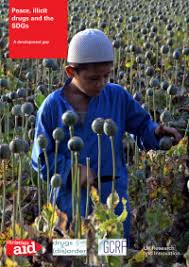'War on drugs' may harm world's poorest, new report warns

Source: Christian Aid
The 'war on drugs; is counter-productive with potentially disastrous consequences for some of the world's poorest and most left-behind groups, a new report has warned.
Ill-conceived approaches of criminalisation and enforced eradication of illicit croplands destroy livelihoods and exacerbate human rights violations of already stigmatised and marginalised groups, according to the report - Peace, Illicit Drugs and the SDGs: A Development Gap.
For some marginalised groups in countries like Afghanistan, Colombia and Myanmar, illicit drug economies are a means of survival - and these groups often suffer from blind spots in development practice that fail to recognise this.
While on one hand the criminalised nature of illicit economies exposes poor communities to high levels of violence, coercion and exploitation, on the other hand they can also provide income, employment and protection amid violence, insecurity and poverty.
The report, published by Christian Aid and as part of a Global Challenges Research Fund consortium, led by SOAS, University of London, highlights the complexity of the issue and urges new approaches that weigh up the balance of harms and gains for these groups.
Well-meaning development practices have attempted to prioritise pro-poor development and align anti-drugs policy with the Sustainable Development Goals (SDGs). But the evidence of these policy reforms are limited.
It is currently unclear how drugs, law enforcement and development work together effectively, the report authors say. Failing to consider the tackling of illicit drug crop economies as part of development rather than simply a law enforcement issue leads to missed opportunities for both development and peacebuilding.
This is especially the case in marginal spaces where extreme poverty, violence, fragility and displacement are rife. Despite the violence and coercion, livelihoods can sometimes by necessity depend on these informal, illicit or criminal economies.
The SDGs provide an opportunity to recognise that peacebuilding is central to ending poverty and hunger, and to provide a framework to encourage a new, contextualised approach that commits governments to build counter-narcotics and peacebuilding initiatives on a sound foundation of research and understanding.
Jonathan Goodhand, professor in conflict and development studies at SOAS, said: "If the aim of counter-narcotics policy is to reduce people's reliance on illicit crops and create peaceful transitions from armed conflict, the criteria of success should not be metrics like "reduction in hectares cultivated" or" kilograms of drugs seized". They should be measures of economic development, access to public services, poverty reduction, respect for human rights, levels of human security, confidence in the state, and access to meaningful employment."
Karol Balfe, who leads Christian Aid's peacebuilding work, said: "Illicit drug economies are sometimes the only way out for people who find themselves in desperate circumstances because they have been excluded from markets and unable to obtain state protection. There is no easy answer to this. But any potential solution by development actors must include the needs and views of those from marginalised territories for whom this is a daily reality.
"They are the real experts in resilience and survival. Peace agreements are more likely to build sustainable peace if they address marginalisation and exclusion, particularly in forgotten borderlands. They must provide people with secure land tenure, access to public services, and alternative economic opportunities to address the factors that attract poor subsistence farmers to illicit activities in the first place.
"We need a clearer, more rounded picture of how illicit economies really work, and the costs and benefits, before we can meaningfully explore ways in which drugs policy and development policy could be brought together in a complementary way to tackle these issues and accelerate our progress towards the SDGs."
Read the full report - Peace, illicit drugs and the SDGs: A Development Gap - HERE


















